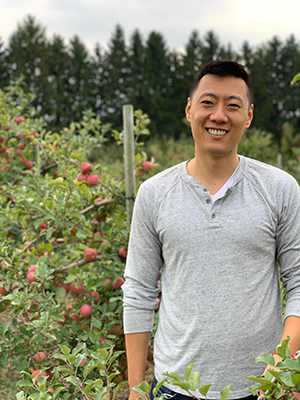Resident Spotlight: Dr. Rongbo Zhu, Clinical Immunology and Allergy
 As a resident in Clinical Immunology and Allergy, Dr. Rongbo Zhu, PGY5, works with patients of all ages, from children to adults. He says the subspecialty program at Schulich Medicine & Dentistry provides extensive hands-on experience in allergy and food immunotherapy.
As a resident in Clinical Immunology and Allergy, Dr. Rongbo Zhu, PGY5, works with patients of all ages, from children to adults. He says the subspecialty program at Schulich Medicine & Dentistry provides extensive hands-on experience in allergy and food immunotherapy.
The small size of the program also promotes collegiality and collaboration. “There are lots of opportunities to get involved within our division and our staff are supportive of us to help meet our educational goals,” he said.
What has been the most rewarding aspect of residency?
The most rewarding part of residency is being able to make meaningful and longitudinal changes in a patient’s life. Nothing compares to seeing a patient through disease to health and knowing that you made a positive impact in their overall life.
I think the most surprising part of residency is how much you learn. When I was at the end of my first year of residency, I recalled thinking how much I had learned and how I couldn’t possibly learn more than this. Now looking back, that one year of knowledge and experience pales in comparison to everything I’ve learned in the past five years.
Why did you choose the School’s Clinical Immunology and Allergy training program?
The Clinical Immunology and Allergy program at Schulich Medicine offers exceptional training and provides strong clinical skills to trainees. We are one of the few programs that consistently sees both adult and paediatric patients during our subspecialty training.
We are also one of the biggest centres in Canada for allergy/food immunotherapy and we provide extensive hands-on experience in dealing with anaphylaxis and food allergies. In addition, the division itself has a great group of staff which really makes this subspecialty training enjoyable.
What is the program’s biggest strength?
I would definitely say the people in my program. Our division is known for its collegiality. All the staff are great to work with, and we have excellent relationships with our allied health staff. Given the small size of our program, our cohort is also very close. Before the COVID-19 pandemic, we were constantly hosting team building activities to explore London and the surrounding areas.
What types of cases and patient populations do you work with?
We see patients of all ages during our training in Clinical Immunology and Allergy. Common patient problems include allergies (seasonal, food, medications, stinging venom), immunotherapy, hives/angioedema, anaphylaxis, asthma and immunodeficiencies.
What learning opportunities have you pursued as a resident beyond the clinical environment?
At Western, I have the opportunity to pursue a wide variety of academic interests.
Currently, my research interest is on the evolving field of telemedicine, as well as quality improvement (QI). Other academic ventures that I was involved in include initiating dedicated teaching sessions for rotating residents and students within Clinical Immunology and Allergy, as well as being involved in the resident programming committee.
There are lots of opportunities to get involved within our division and our staff are supportive of us to help meet our educational goals.
What do you enjoy most about living in London?
London has lots of nature and is full of hiking trails which are great to discover. There are also ample restaurants rich in diversity waiting to be explored.








